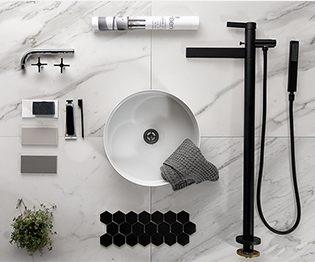
Société de transport de l'Outaouais // COBALT Architectes // photo credits: Immophoto - Alex Léveillé
Meeting and even surpassing fire safety requirements
A significant, albeit perhaps lesser-known, advantage of KeraTwin K20 ventilated cladding is its fire protection qualities. This type of cladding meets the Euroclass DIN EN 13501 fire protection standard and classifies as a non-combustible material. Additionally, if a fire occurs, it will not smoke or form molten drops/emit sparks. In case of fire, it will not emit toxic gas and is very stable, as it does not contain any organic elements.
For optimal fire protection, we recommend installing non-combustible mineral insulation and fire stops in addition to ceramic cladding.

Ordre des infirmières et infirmiers du Québec (OIIQ) offices // Architect: Lemay // photo credits: Adrien Williams
KeraTwin K20 ventilated cladding at a glance: a material with unique properties that does not compromise building quality or aesthetics
In addition to the wide variety of available colours, ventilated cladding offers many benefits. HT technology, which involves permanently burning a catalyst into the tile glaze, is without a doubt one the biggest advantages of the product. The catalyst is activated by contact with light, air and humidity, creating an antibacterial surface. Ventilated cladding is sought-after for its durability, easy maintenance, colours that retain their shine year after year, and especially their impressive resistance to temperature shifts and Quebec’s cold climate.
Design, durability and safety: three words that perfectly sum up the advantages of KeraTwin K20 ventilated cladding. For more information on this product, please contact your Céragrès representative.

Société de transport de Montréal (STM) Stinson bus garage // Architect: Lemay // photo credits: Stéphane Groleau
Cover photo: Ô Cartier condos // Architects: Concept Lupien Matteau and Techniques Barin // photo credits: Olivier Gariépy

 Start over
Start over